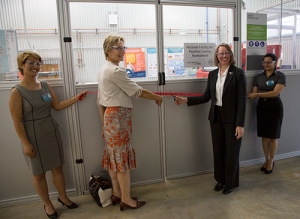Seeing a future in the pipeline
Research news
The National Facility for Pipelines Coating Assessment has been launched at Deakin's Waurn Ponds campus.
Located within the Proof-of-Concept Building at the Institute for Frontier Materials, the Facility is an initiative of the Energy Pipeline Co-operative Research Centre.
The new Facility was set up in response to industry needs, with the launch on 5 March attended by around 50 guests, including a number of CRC and pipeline industry representatives, as well as Deakin staff and students.
The initiative will provide an independent facility to perform oil and gas pipeline coating testing and will help to build Australia's capability to support pipeline coating selection and development through cutting edge research. The Facility is jointly managed by Deakin's School of Engineering and Institute for Frontier Materials.
Deakin’s Deputy Vice-Chancellor (Research) Professor Lee Astheimer congratulated the Facility's managers for developing the project so quickly.
"Deakin was a relative late-comer to the CRC, which was established in 2010, so it has been wonderful to see the rapid rise of both the CRC and this Facility," Professor Astheimer said.
"Our staff have been busy identifying research needs and taking the initiative to find solutions that will have an impact on energy efficiency and infrastructure sustainability throughout Australia."
At the launch, industry representatives said that there has been a desperate need for this new facility as a critical part of the industry, particularly given the age of a number of major pipelines in Australia, with many coming towards the end of their lives.
Mr Alan Bryson, Integrity Manager with East West Grid, APA Group, said that corrosion is one of the major risks of energy pipelines, with premature corrosion potentially leading to costly problems and serious situations.
"Public utilities used to provide this type of research, but privatisation and competition have meant that no one company in industry has had the critical mass necessary for this type of research and testing. We will now get the independent testing that we need to support the commercial aspects of our work," Mr Bryson said.
Professor Valerie Linton, CEO of the Energy Pipelines CRC, added that a feature of the CRC is its strong partnership with the Australian Pipeline Industry Association, which has around 500 members, representing about 50 companies. "This CRC sets the benchmark for genuine collaboration," Professor Linton said.
Program Leader, Professor Mike Tan, Professor of Applied Electrochemistry and Corrosion Technologies within the School of Engineering, said that research will focus on coating, testing and understanding corrosion behaviour, so that "fundamental understandings will support applied, focussed research."
The Energy Pipelines CRC is a collaboration between Deakin, the University of Wollongong, Adelaide University, the ANU and industry, represented through the Australian Pipeline Industry Association.
Share this story
 Deakin’s Deputy Vice-Chancellor (Research) Professor Lee Astheimer and Professor Valerie Linton, CEO of the Energy Pipelines CRC, open the National Facility for Pipelines Coating Assessment.
Deakin’s Deputy Vice-Chancellor (Research) Professor Lee Astheimer and Professor Valerie Linton, CEO of the Energy Pipelines CRC, open the National Facility for Pipelines Coating Assessment.
